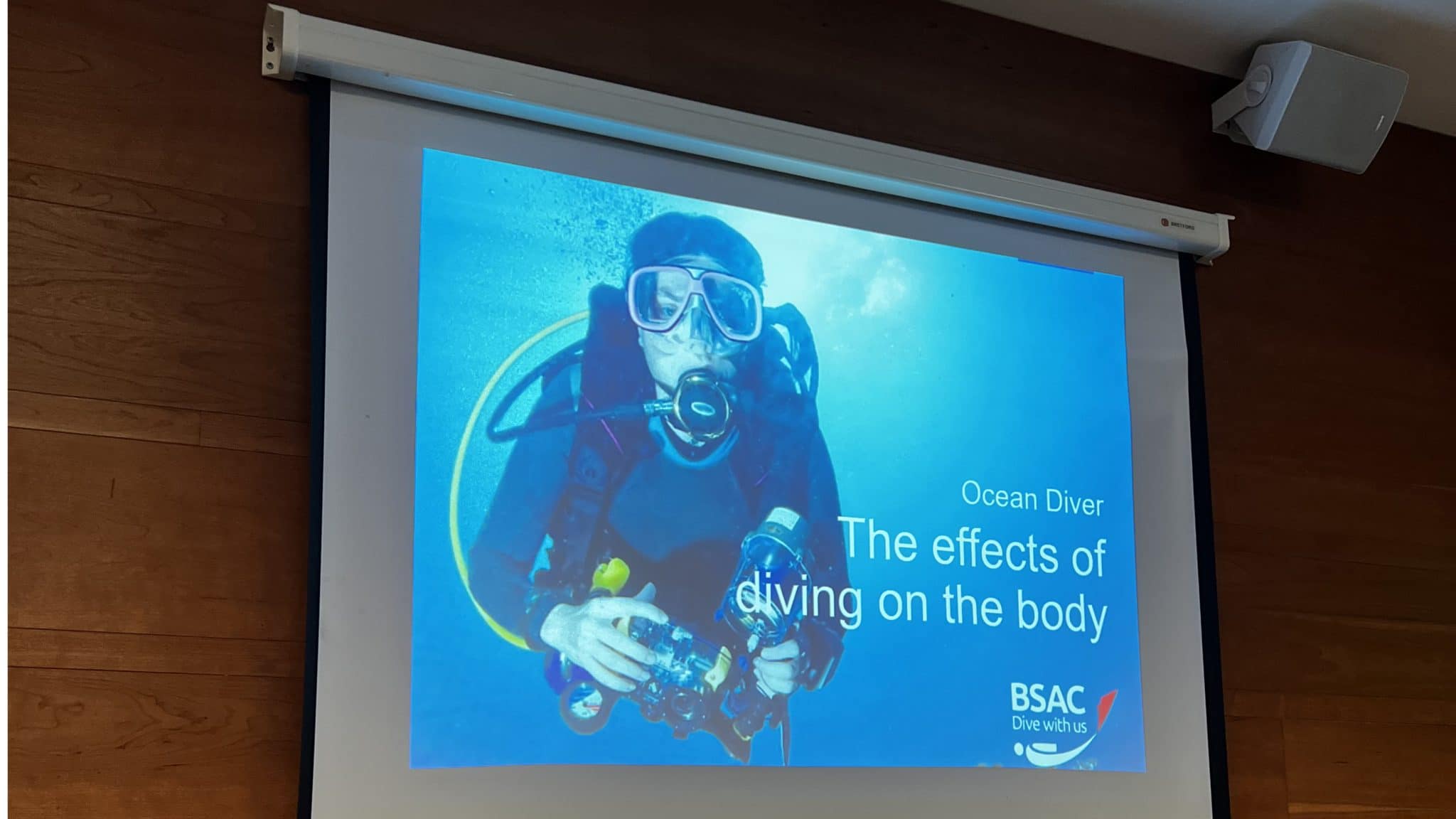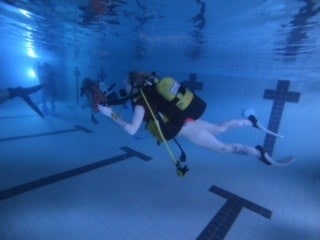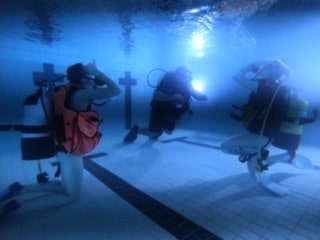Dive Training Blogs
Diving Diaries (Part 3)

In this new series Scubaverse blogger, Isobel Fairbairn, keeps a diary as she learns to dive with her university BSAC club (Salford University Diving Society or SUDS for short). Follow her progress as she heads underwater for the very first time.
My third week of my dive training and so far, I’d argue my hardest.
Our theory this week consisted of all the “what happens if?” questions and answers, all the terrifying dangers that come with diving if proper safety is not ensured.
Of course, some of it feels like common sense, paying attention to your surroundings, always making sure to check on your buddy, but some of it really isn’t common sense, and I came away with a head full of new information (and anxieties) that I wish I’d left in the classroom. But of course wishes don’t often come true and I am well aware of the fact all of this information is to make sure we are all practicing proper procedure and therefore at our safest, so all of this information won’t be leaving my brain anytime in the future.
This week we learnt about DCI; the symptoms, preventions and treatment. We were informed on the importance of anticipating problems, being prepared and how prevention is better than a cure! We were presented with the “incident pit”, the pit of horrors type diagram and how its significance holds great importance as one thing can lead to another and suddenly you can be out of your depth, both literally and metaphorically.
We were also shown the importance of having proper gas canister checks and the issues that can come with contaminated breathing gas, oxygen toxicity and Nitrogen narcosis.
Onto the practical session of the evening:
Backwards rolling into the pool to begin with ended up being quite enjoyable, it was our first time trying it out and as nervous as I was when I stood with my back to the water with my feet on the edge of the pool, it went a lot smoother than I expected. I’ll be brutally honest I think I almost fell in backwards anyway, so I just went with it without giving myself too much time to overthink it. Following a backwards descent into the water me and my buddy then did a swim around the pool, monitored by our instructor where we used the hand signals we had learnt so far in practice on our own i.e. “I’m the leader”, “you’re the leader”, “are you okay?” “gas check?” this was fun, it was exciting to be able to freely swim around and use the information I’d learned (and realised it had stuck and I was getting better each week!)
Next up came the bit I’d like to now tell readers I’m STILL working on, if anyone has any miracles for how to do this easily, someone, please, enlighten me, my mermaid dreams felt like they were slipping from my grasp during this task.
We had to perform a mask removal underwater and reapply the mask after we had removed it. Now I’m sat, on my knees, underwater watching my buddy do this procedure, she completes it, very well might I add, and during every single one of those painstaking minutes watching her, my sense of dread is just slowly increasing, next thing I know my instructor is Infront of me asking me to now perform the mask removal so what do I do? Obviously I take my mask off! And then I panic, I bottle it. I come up to the surface, gasping for air a little bit, even though I’ve had my reg in the whole time, I’m still panicking at this point and I’m very aware that I just don’t think I’ll be getting this done this session.
My instructor, who is a very lovely man tells me to just take time off and we can get it done next time and not to worry, but, of course I spend the next two hours worrying, listening to my already qualified friend Jamie tell me to “just practice in the bath, it’ll be fine” much to my amusement, but I actually may take this as serious advice. So, to my mother, if you’re reading this now, please don’t be surprised if you catch me snorkelling in the bath when I’m home for easter.
Blogs
PADI Recognises EMEA Members with New Professional Development Excellence Award

PADI® (Professional Association of Diving Instructors®) has recently launched their new Professional Development Excellence Award in EMEA (Europe, Middle East and Africa), celebrating PADI Five Star Instructor Development Centers (IDC) that are championing creating more PADI Professionals, at all levels, during the previous calendar year.
“While becoming a PADI Five Star IDC Center is a prized accreditation amongst members, this exclusive rating comes with the responsibility of training the next generation of divers to become PADI Instructors,” explains Dave Murray, Managing Director for PADI EMEA.
“PADI’s commitment to a continuing education philosophy encourages divers to realise their dreams of a career as a PADI Pro, teaching others to do what they love – to scuba dive. This new recognition award distinguishes productive PADI Five Star IDC stores for the time and effort they dedicate to marketing and conducting the professional training needed to grow the scuba diving industry.”
PADI’s EMEA Professional Development Excellence Award recognises members for reaching specific milestones based on the number of PADI Pro certifications they issue annually. It also provides an extra layer of credentials in their “Pro Development Status” to potential Divemaster and IDC candidates, along with any other prospective Pro-level customers and prospective employees.
The first awards were distributed earlier this year, with 12 PADI Five Star IDC Centers receiving the Platinum Award. This means that they have issued a minimum of 100 PADI Professional certifications from Divemaster to IDC Staff Instructor, which include 30 Core Professional certifications and 70 Continuing Education Instructor level certifications.

The 2025 PADI EMEA Professional Development Excellence Award is already underway and renewed PADI EMEA Five Star IDC Dive Centers and Resorts are automatically eligible. Stores that reach the recognition levels during 2024 will receive their award in the first quarter of 2025.
For more information about the award and to see the full list of award recipients visit here.
About PADI
PADI® (Professional Association of Diving Instructors®) is the largest purpose-driven diving organization with a global network of 6,600 dive centers and resorts, 128,000 professional members, and more than 30 million certified divers to date. Committed to our blue planet, PADI makes the wonder of the underwater world accessible to all, empowering people around the world to experience, explore and take meaningful action, as Ocean TorchbearersTM, to protect the world beneath the surface. For over 50 years, PADI is undeniably The Way the World Learns to Dive®, setting the standard for the highest quality dive training, underwater safety and conservation initiatives while evolving the sport of diving into a passionate lifestyle. For divers by divers, PADI is obsessed with transforming lives and, with its global foundation, PADI AWARETM, creating positive ocean change. Seek Adventure. Save the Ocean.SM www.padi.com
Blogs
Two great programs to thrill and excite from RAID

RAID’s Performance Diver program is part of the training agency’s unique ‘tune-up’ options for divers at all levels, from basic to technical. Its appeal to newer divers who did not get all they wanted from their open water course (perhaps with a non-RAID dive centre) has always been strong. But it’s a winning option for someone who has been inactive for a while as well.
The skills taught in this course have been designed by some of the most respected dive professionals in the industry. They have condensed years of in-water experience into a great program that’s fuelled by great ideas and solid knowledge. Something useful in all sorts of conditions and all sorts of gear configurations. In short, a range of skills you will use on every dive: buoyancy, trim, situational awareness, gear selection and management, contingency planning… having fun and staying safe.
You can find out more about RAID’s Performance Diver program here.
And with the agency’s renewed focus in 2024 on breath-hold programs, July is a good time to read about the benefits of RAID’s range of Freediving courses.
Freediving is such an exhilarating and beautiful sport that allows you to connect with the underwater world in a unique way.
The thrill of diving deep down, holding your breath, and exploring the depths with just a single breath is truly an unforgettable experience.
It requires focus, control, and a deep respect for the ocean. The sense of freedom and tranquility you can find while freediving is unlike any other.
Have you ever tried freediving or are you interested in learning more about it? You do not have to be a scuba diver to start… not at all!
And if you are already a diver, RAID can help you discover a whole new way to look at a familiar world.
You can find out more about RAID’s Freediving courses here.
To find out more about RAID and the agency’s diver training programs, visit diveraid.com.
-

 Blogs2 months ago
Blogs2 months agoDiving With… Nico, Ocean Earth Travels, Indonesia
-

 News1 month ago
News1 month agoMurex Bangka Announce New Oceanfront Cottages & Beachfront Dining
-

 Blogs2 months ago
Blogs2 months agoA new idea in freediving from RAID
-

 Marine Life & Conservation1 month ago
Marine Life & Conservation1 month agoIceland issue millionaire whale hunter a licence to murder 128 vulnerable fin whales
-

 Marine Life & Conservation2 months ago
Marine Life & Conservation2 months agoThe Shark Trust Great Shark Snapshot is back
-

 News3 months ago
News3 months agoCharting New Waters; NovoScuba Goes Global with the Launch of their Revolutionary Dive Training Agency!
-

 Gear News1 month ago
Gear News1 month agoNew Suunto Ocean – a dive computer and GPS sports watch in one for adventures below and above the surface
-

 Marine Life & Conservation Blogs2 months ago
Marine Life & Conservation Blogs2 months agoBook Review: Plankton


















